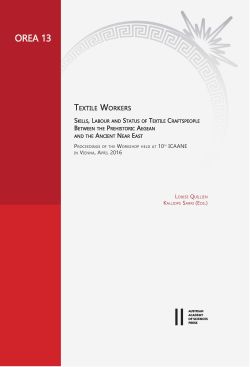
Textile Workers. Skills, Labour and Status of Textile Craftspeople Between the Prehistoric Aegean and the Ancient Near East, pp. 109-123, 2020/04/30
Proceedings of the Workshop held at 10th ICAANE in Vienna, April 2016
This paper explores the high complexity of textile skills and the diversity of kinaesthetic knowledge required by various textile labours with reference to textile technology in Bronze Age Greece. The tacit nature of textile skills, the subjective experience of textile labour, and the ways in which skills may have been transferred are discussed. The paper also presents the results of a long-term monitored process of gaining a basic kinaesthesia in textile skills by contemporary actors (students of archaeology from the University of Warsaw) which may refer to craftsmanship and apprenticeship. The documenting of contemporary hands-on experience in textile manufacturing, specifically in weaving, is argued as being one of the methods of translating tacit, non-discursive knowledge into a verbalised academic discourse. Major pedagogic outcomes of the experience approach to studies on textile technology are outlined in order to highlight the expediency of hands-on practical learning about textiles and textile archaeology. The paper also aims to demonstrate that the experience approach to investigating skills, if translated into the academic discourse, may be further exploited as a potential comparandum in research on textile work, its specialisation and apprenticeship.
Keywords: textile archaeology; textile technology; Bronze Age Greece; Minoan Crete; Mycenaean Greece; experimental archaeology; hands-on experience